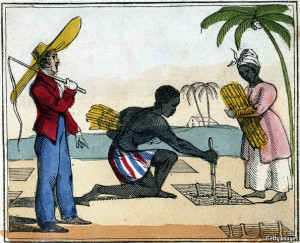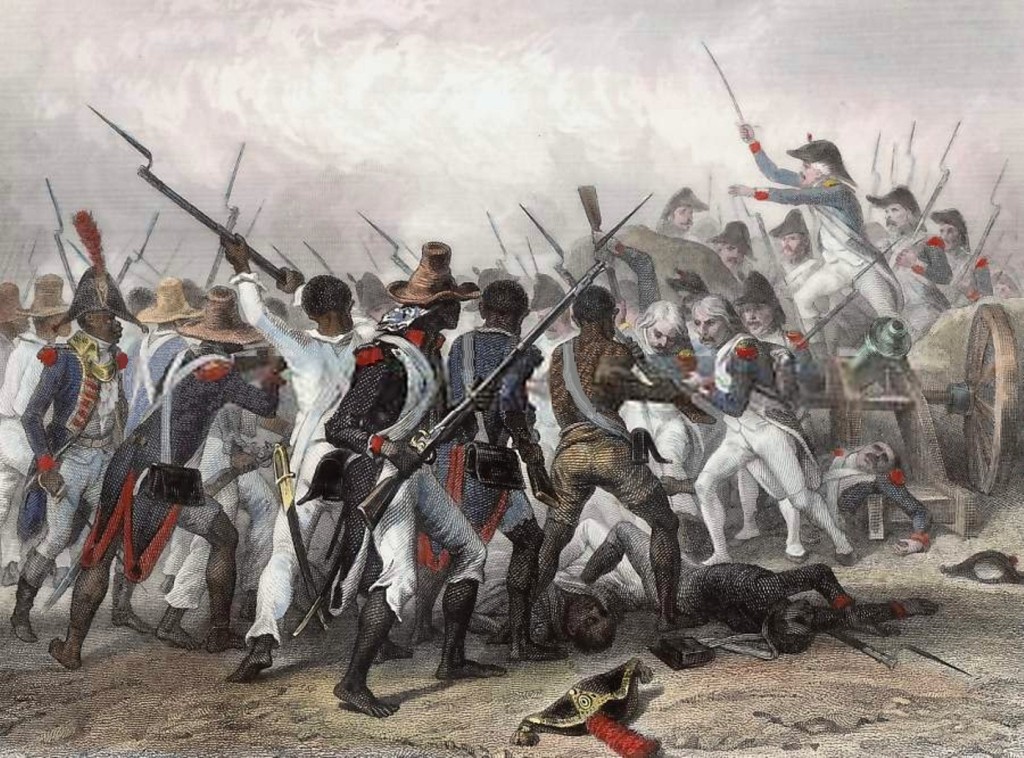 The media are lauding President Francois Hollande for announcing that France will finally right one of history’s greatest wrongs by forgiving what remains of Haiti’s “independence debt.”
The media are lauding President Francois Hollande for announcing that France will finally right one of history’s greatest wrongs by forgiving what remains of Haiti’s “independence debt.”
In an address at the opening of the memorial and cultural centre in Guadeloupe on Sunday, Hollande said Haiti’s debt of US$81.2 million will be cancelled…
Haiti, which became the world’s first black republic after winning its war of independence in 1804, agreed to pay the debt in exchange for official recognition from France in 1825.
(Jamaica Observer, May 11, 2015)
Mind you, the media lauded his predecessor Nicolas Sarkozy five years ago, in the immediate aftermath of Haiti’s earthquake, for announcing the same.
More to the point, there’s this:
Haiti’s current economic crisis and political turmoil have their roots in the ‘odious debt’ of 150 million gold francs (later reduced to 90 million), which France imposed on the newborn republic with gunboats in 1825.
The sum was supposed to compensate French planters for their losses of slaves and property during Haiti’s 1791-1804 revolution…
It took Haiti 122 years, until 1947, to pay off both the original ransom to France and the tens of millions more in interest payments borrowed from French banks to meet the deadlines.
(Haïti Liberté’s Statement for the European Parliament In Support of Pan-Afrikan Society Community Forum (PASCF) Global Research, May 10, 2013)
 I suppose CARICOM countries should be thankful that, instead of becoming republics after the abolition of slavery (in 1833), we remained colonial territories for another 125-plus years. No doubt this is why, unlike France, Britain compensated its slave owners for their losses directly (in 1834). Never mind the moral hypocrisy in these countries compensating slave owners instead of those they enslaved. (Even so, see below, in my “Ten-point rebuttal to demands for reparations,” why reparations for slavery are neither morally compelling nor legally feasible today.)
I suppose CARICOM countries should be thankful that, instead of becoming republics after the abolition of slavery (in 1833), we remained colonial territories for another 125-plus years. No doubt this is why, unlike France, Britain compensated its slave owners for their losses directly (in 1834). Never mind the moral hypocrisy in these countries compensating slave owners instead of those they enslaved. (Even so, see below, in my “Ten-point rebuttal to demands for reparations,” why reparations for slavery are neither morally compelling nor legally feasible today.)
Meanwhile, the entire world had a vested interest in seeing this new Black republic fail. This is why France was able to extract onerous payments from Haiti so easily. I commented on this racist conspiracy in “Haitian: Returning to Africa; Blaming the US and France?!” February 12, 2010.
___________________
The U.S. and France led other nations in a conspiracy to ensure that Haiti would suffer crib death as a nation after winning independence in 1804.
The Americans participated because they deemed it too politically untenable to have a nation of Black revolutionaries enjoying democratic freedoms in their backyard, while their young nation was still so dependent on the institution of Black slavery. Their hypocrisy had to have been palpable; but it clearly paled in comparison to the fear these Americans had of embers from the fires of revolt that liberated France’s Haitian slaves eventually igniting similar fires among their American slaves.
The French participated merely to avenge their defeat by these Haitian revolutionaries – who, ironically, emulated the way American revolutionaries defeated the British … with the help of the French.
____________________
America was founded on the principle that “all men are created equal;” France, on “the rights of man.” Yet the institution of slavery continues to haunt and render both founding principles hypocritical in so many ways.
In any event, far from forgiving what remains of interest payments on Haiti’s independence debt, France should be begging Haiti for forgiveness … and paying restitution.
On Reparations
At its March 2014 Inter-Sessional Meeting in St. Vincent and the Grenadines, CARICOM presented a “10-point plan for reparations.” Chief among its demands are a formal apology, right of return to Africa, debt cancellation, and, my favorite, PTSD therapy (I kid you not!).
To rebut its plan, here are 10 points I’ve argued against reparations over the years — in such commentaries as “The Fatally Flawed Demand for Reparations for African Slavery,” Caribbean Net News, February 16, 2007.
- CARICOM is banking on public shaming and political pressure to compensate for shortcomings in its legal arguments. Corporations often settle cases (even frivolous ones) to avoid bad publicity. CARICOM’s craven strategy assumes that European governments will do the same. Except that this would only constitute a triumph of European paternalism and self-recrimination over Caribbean pride and self-responsibility—the “damning irony” be damned.
- The most sympathetic European and American leaders, most notably former UK Prime Minister Tony Blair and U.S. President Barack Obama, are on record opposing reparations. And it would strain credulity even for these two opportunistic politicians to “evolve” to the point of supporting reparations—if it became politically expedient to do so.
- CARICOM cannot establish proximate cause between the injustices complained of (i.e., slavery) and any harm any living Caribbean native has suffered.
- The U.S. government paid reparations for the Tuskegee Syphilis Experiment precisely because claimants could establish this causal link. This is also why the UK government paid reparations for atrocities committed during colonial rule in Kenya; specifically, during its brutal suppression of the famous Mau Mau Rebellion.
- Apropos of proximate cause, it should be particularly instructive that Jews demanded and received reparations from Germany for “slave labor and persecution” suffered during the Holocaust. But they have not demanded reparations from Egypt for slave labor and persecution suffered during 400 years of slavery.
- Equitable justice would require CARICOM’s demand for reparations be offset by the objective benefits Blacks received during colonialism (most notably education and grounding in civil society), as well as post-colonialism (most notably foreign aid)—all of which might fairly be considered restitution payments.
- Even if politically incorrect, there’s probably no better argument against reparations than juxtaposing thriving development and good governance in former British colonies in the Caribbean with chronic strife and political skullduggery in Africa—not just in countries where (European slavery) never existed, but also in those where European colonialism gave way to African nativism, which has manifested most despairingly in continual tribal/ethnic conflict.
- CARICOM claims “Persistent racial victimization of the descendants of slavery and genocide as the root cause of their suffering today… [and] the primary cause of development failure in the Caribbean.” This is patently specious and makes a mockery of our regional pride as independent nations.
Most former slave colonies in the Caribbean are now fairly successful middle-income countries, or better. On a PPP basis, the Bahamas has a GDP per head close to that of Spain or Italy. Barbados scores higher on the U.N. Development Programme’s human-development index than any of its much larger South American neighbours.
(The Economist, October 5, 2013)
- President Obama has argued that the best form of reparations for slavery is government investment in education and employment opportunities that benefit poor Blacks. But the U.S. government could argue that the trillions it spent on social and welfare programs in Black communities, just since the 1960s, are more than enough to offset reparations for American slavery. The UK government could argue the same for British slavery—given the billions it spent during colonial rule and in foreign aid to CARICOM countries since then.
- Post-colonial Africa seems fated to loom amidst the continents of the world as a dark, destitute, diseased, desperate, disenfranchised, dishonest, disorganized, disassociated, dangerous and ultimately dysfunctional mess. So, notwithstanding slavery, Blacks born in America and the Caribbean should probably thank their lucky stars that neither Abraham Lincoln nor Idi Amin doppelganger Marcus Garvey succeeded in “repatriating” Blacks to Africa. In other words, thank God we are here and not there! I just hope the damning irony is not lost on any proud African that, 50 years after decolonization, hundreds of Africans (men, women, and children) are risking their lives, practically every day, to subjugate themselves to the paternal mercies of their former colonial masters in Europe.
Related commentaries:
Haiti’s compassionate poseurs
CARICOM demand…
Haitians returning to Africa…
Lampedusa tragedy…

Legacy Note: With over 5,600 posts spanning 20 years, I am easily the most prolific blogger on the most eclectic array of topics on the web. That makes The iPINIONS Journal an unparalleled archive of informed political and cultural commentary. Visit the ARCHIVES section in the sidebar or search by topic. You won’t find a more consistent, independent voice on world affairs.

